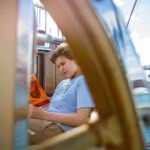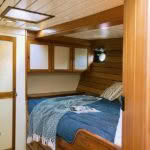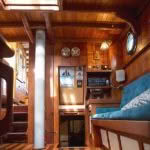Inside Fiona Campbell’s majestic staysail schooner and Wanaka home
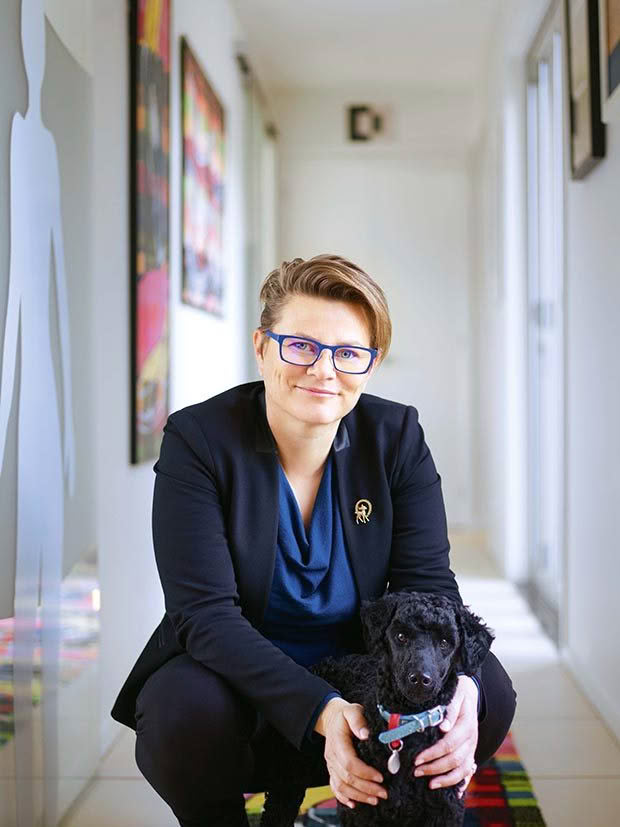
Fiona with pooch Max.
Coming into a great deal of money isn’t a guarantee of an easy life. It takes tenacity and planning to live well, says someone who knows.
Words: Kate Coughlan Photos: Rachael Hale McKenna (Wanaka house) and Tessa Chrisp (schooner)
“So what do you do with yourself if having to work to put food on the table is no longer your motivation for getting up in the morning?” This was the question that hounded Fiona Campbell after a large financial windfall. The money didn’t only fall into her lap, it whirled her into a tornado of paperwork, lawyers and financial advisors, all waving portfolios and stock certificates in her face. Money certainly might seem like the answer. But, for Fiona, the cash came at a cost.
“Don’t get me wrong,” she says acknowledging her spacious Wanaka kitchen hung with art, “there are positives, of course. All I’m saying is that there have also been some hairy moments of doubt, depression and downright terror. If I had to go through it all again, I’d want to talk to someone with similar experiences – but without a sales agenda – to guide me through the tumultuous landscape of instant wealth.”
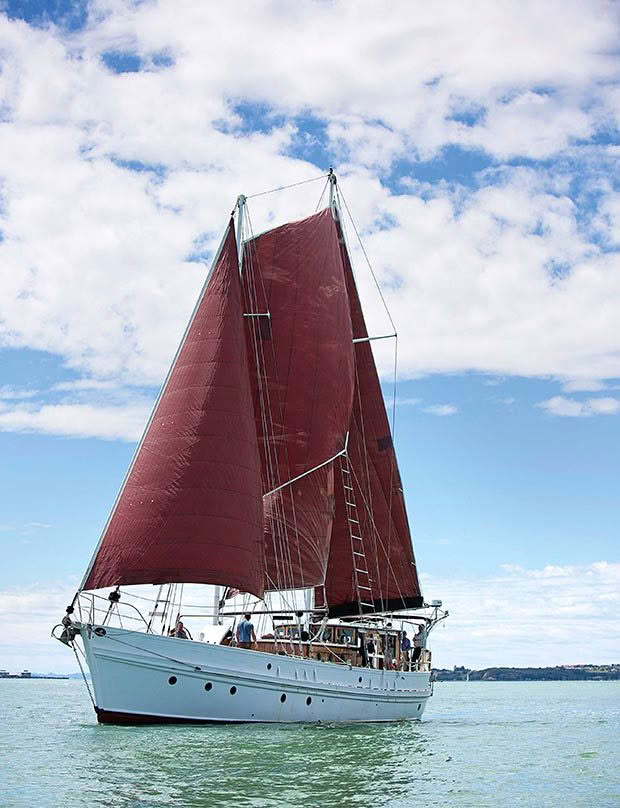
Ruah, Fiona Campbell’s 20-metre staysail schooner, currently moored at Auckland’s Westhaven Marina, has taken the family on many happy cruising holidays.
So how did Fiona Campbell, Wellington born, bred and educated, a graphic design and cast-glass graduate, and mother of two sons (Neco, 14, and Carlin, 18) come into millions? Trade Me.
Fiona and her then-husband Mark Richter were initial investors. Mark and his team were business advisors and office-space providers for the start-up of the online auction business launched by Wellingtonian Sam Morgan.
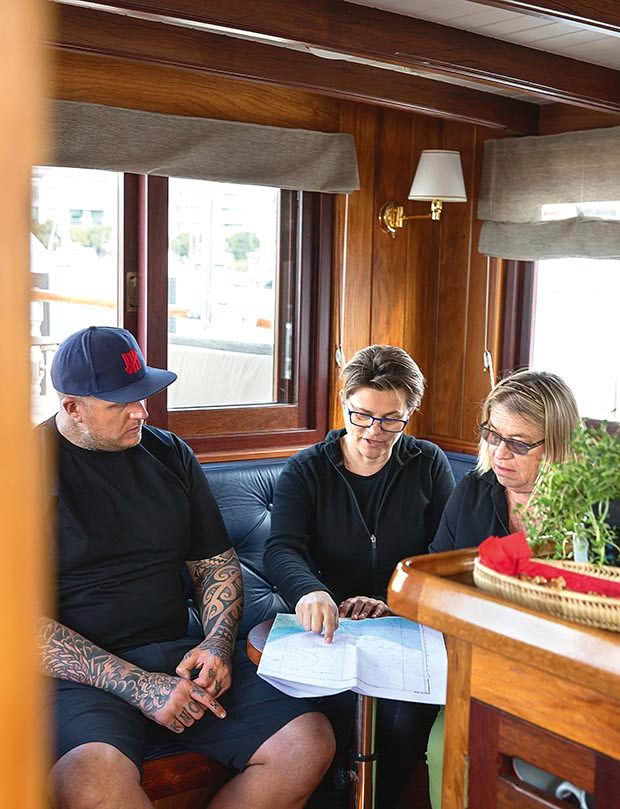
Yachting great Penny Whiting and her son Tiny aka Carl are in charge of the schooner under sail, keeping the family cruising stress free.
Fiona and Mark were there through the early tough years when the company needed increasing injections of cash and expertise. “It wasn’t a painless journey,” says Fiona. “You know how sometimes when you ride a bike and if your chain isn’t quite on properly you pedal lots, but just don’t seem to get anywhere? That’s what it was like for many years with Trade Me – a lot of frenetic activity and not much achievement. It was tense at about the three-year mark when we had to ask, “Do we keep funding or cut its throat?’”
Fiona says she was only on the periphery but caught the excitement when Trade Me suddenly got over a hurdle and was off, growing and steadily gaining market share. Then, 11 years ago, Fairfax Media swooped in and paid a whopping $700 million for it. And Fiona and her family’s life changed – dramatically.
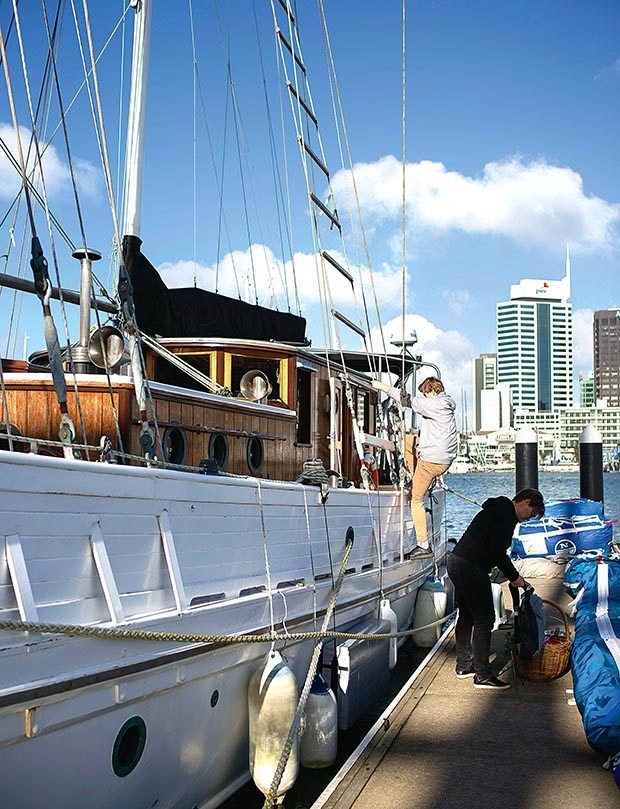
Ruah, which sleeps 14 and has six cabins, was built in 1944 for the Australian navy as a survey ship before being converted into a comfortable cruising vessel keeping its yesteryear charms.
“It’s funny coming into lots of money. And it was lots, more money than this girl ever contemplated having in her entire life. But what do you do with yourself if you don’t have to work?” Fiona’s ethos, which was shared with her then-husband, was to give back and in giving back she found a way forward.
“We were searching for a project that would make a difference to us and the people it touched. It would have been real easy just to give all the money to, say, a clean water charity in Africa, or to fighting poverty in south Auckland. And they are really worthy causes. But that wouldn’t have built a career for me. I thought – selfishly – if it’s going to be my money behind it I’d actually like a job, a reason to get out of bed. It’s too damn easy to sign a cheque and kiss the cash goodbye.
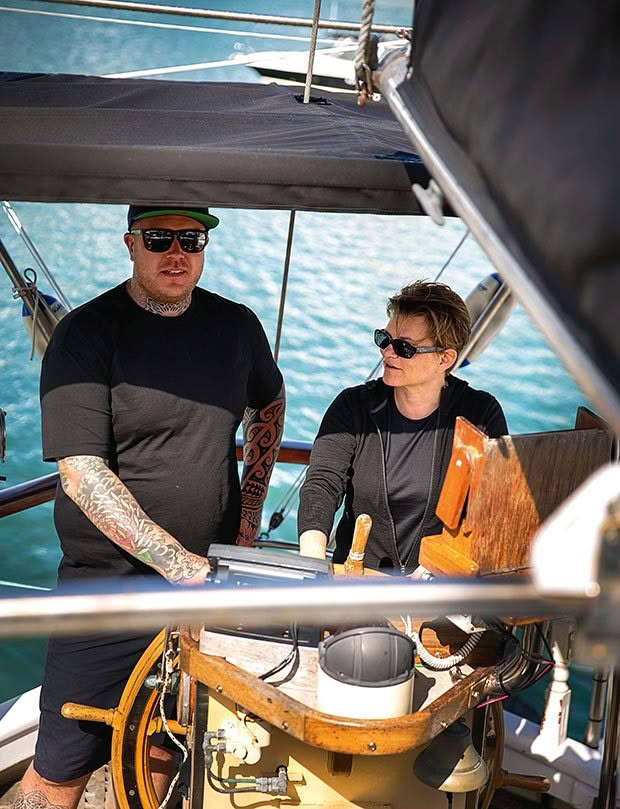
Carl with Fiona at the wheel of Ruah.
“Our goal with the project we developed, the Real Art Roadshow, was to stimulate creative thought among schoolkids through visual arts. Creative thought is the basis of everything great and we believe visual arts promote creativity.
“You can be the most talented sportsperson in the world but if you can’t think creatively out of a tight squeeze then you are not going to be good long term. You can be as business-focused as you like, but if you aren’t creative you are not going to have an edge.”
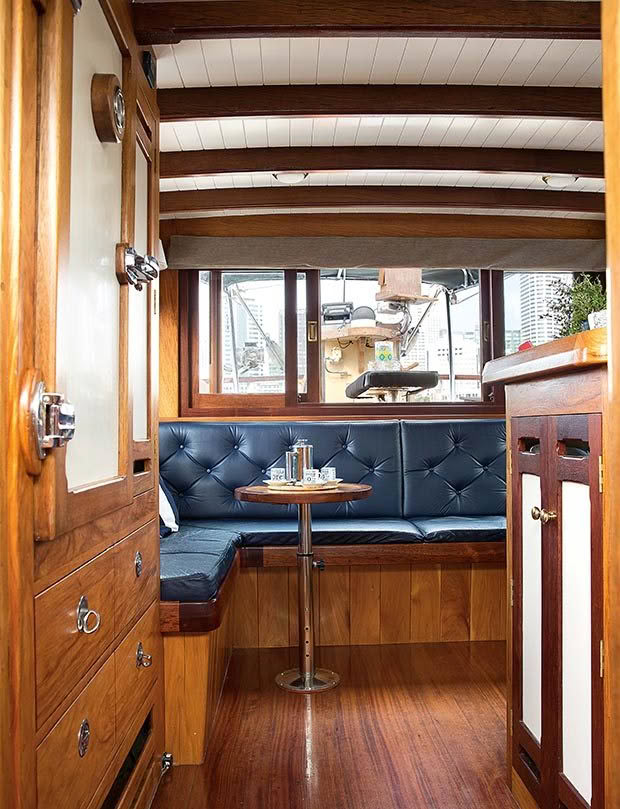
Fiona has enjoyed upgrading the impressive schooner but it’s now time to part company and it is for sale.
During Fiona’s teenage years, one experience provided her with a ringside seat on how innovative thinking can find solutions even in the face of substantial barriers. Her father and mother (Kevin and Susan Campbell) became known internationally for solving the mystery of an airline tragedy.
In 1989, Fiona’s brother Lee Campbell and eight others were sucked through the ripped fuselage of United Airlines flight 811 bound for Auckland. It is an extraordinary story of how a classic car restorer and his admin officer wife from Miramar, Wellington, refused to be intimidated by dozens of highly paid airline barristers in the American courts and eventually came to explain why an aircraft peeled apart in mid-air with such tragic consequences.
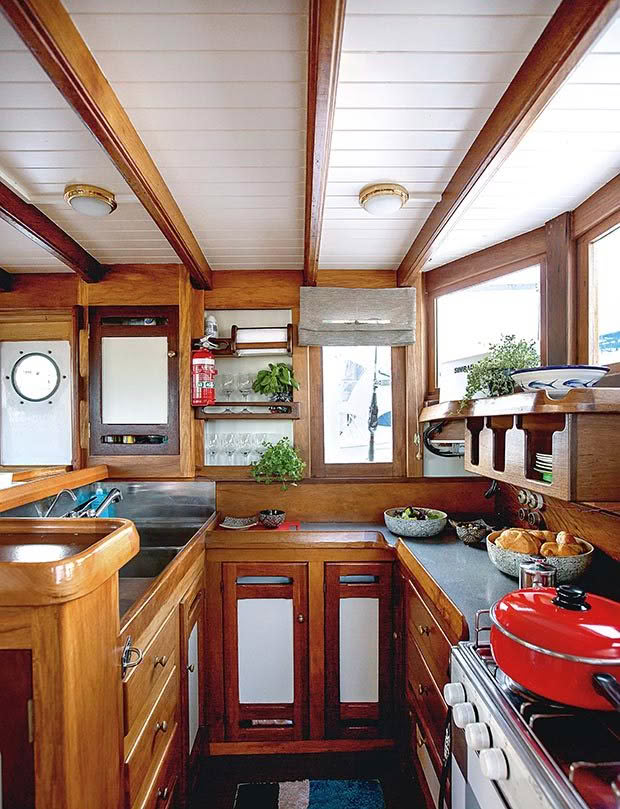
Prior to the investigative work of Kevin and Susan, ground crew had been mistakenly blamed for failing to correctly close the aircraft’s cargo door and causing the nine deaths – a terrible burden to bear.
What her parents discovered, through doggedness and cleverness, certainly saved other lives as well as exonerating the ground crew. It was an aircraft design fault that caused the cargo door to unlock, fly off and rip the hole in the plane. Coming from a family capable of solving the mystery of an international air disaster no doubt drives Fiona’s belief in the value of creative thought in young people.
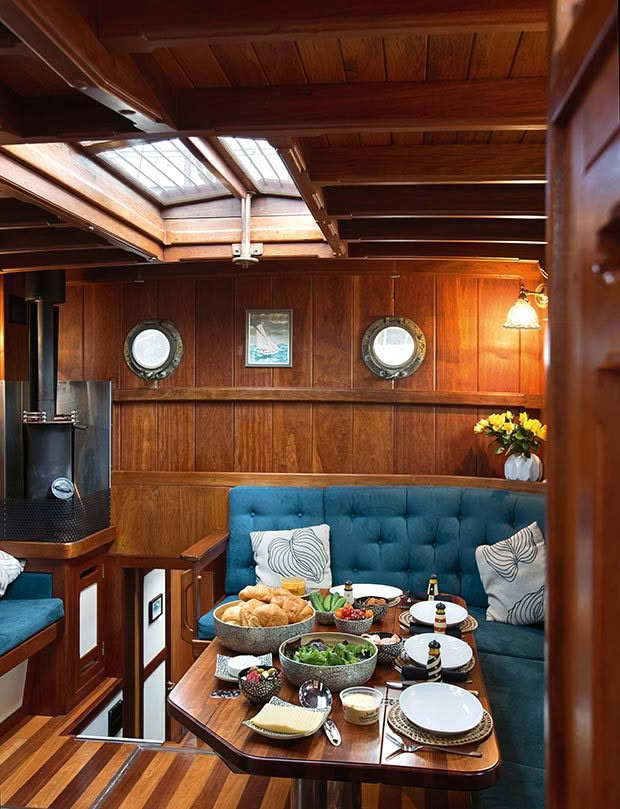
“We set out to foster creativity in schoolkids of all ages. If you can do that, and if you are very lucky, then one of those kids might be the one to solve other problems. They might find the solution to poverty in south Auckland or they might develop a way to bring clean water to poor African regions. Money alone can’t solve those problems. No matter how much we’d have been prepared to throw at it, we’d have made no difference. But who knows what a clever kid can do.”
- Fiona’s sons Neco (reading in a cabin) and Carlin have enjoyed many family holidays aboard the boat.
By the time Fiona set out on her Real Art Roadshow journey, she and her husband had amicably parted ways. Fiona purchased high-calibre New Zealand art works and sent them to schools throughout the country in a large truck and trailer. Sometimes – and she still finds this amusing – the vehicles were of as much interest to the kids as the art itself.
There’s one aspect of coming into a lot of money that does not require creative thinking but the opposite. And that’s keeping accounts. Despite Fiona being a meticulous record-keeper, the IRD was sufficiently intrigued that they began to take an interest in her affairs.
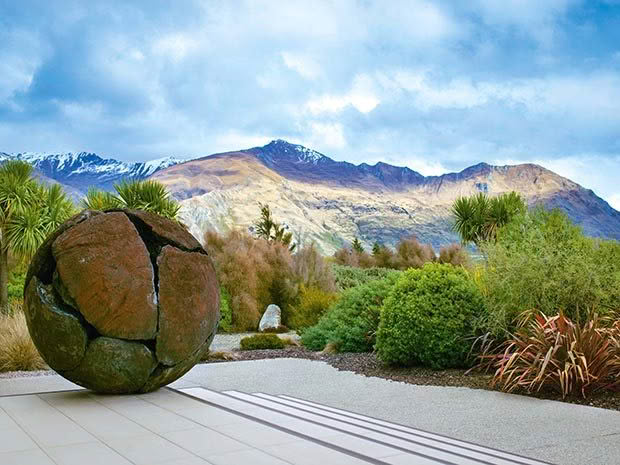
Fiona’s native plant garden established quickly, giving her much-wanted privacy after she moved to her Wanaka house 12 years ago. It is a fantastic garden in which to hide sculptures.
“On paper, my business must have looked crazy. I mean, who gives away millions of their own money on an art project for schools? Maybe the IRD thought I was laundering money or doing something shifty so they decided to do a complete audit. It was scary. With IRD audits, even if you’ve never done anything wrong, you’ve probably made mistakes that might lead to a finding of wrongdoing. And it was expensive because I had to have my professionally done accounts re-done in a certain way, by other costly professionals.”
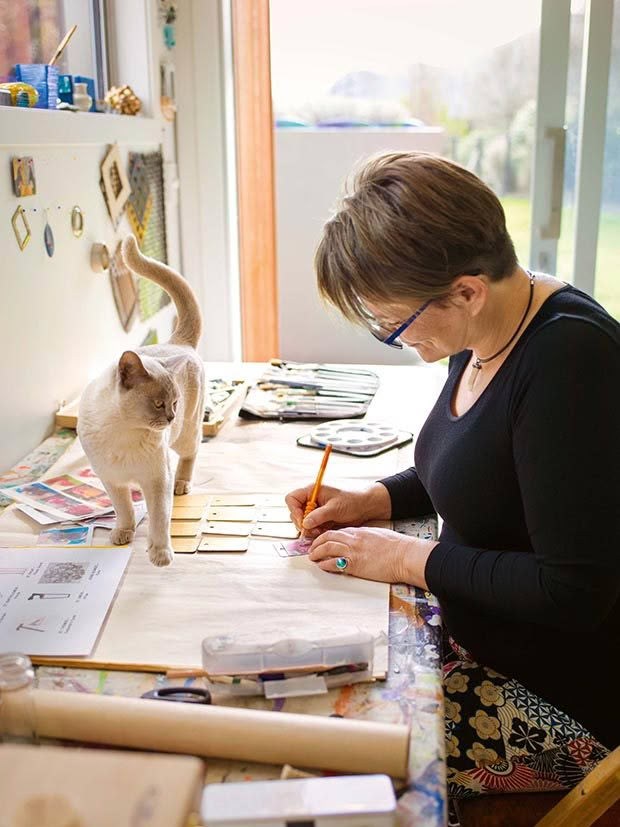
Bella, the burmese, helps Fiona with her miniature paintings of chickens.
At almost the same time as she was having her finances audited, she received a letter of an entirely different nature from another arm of the government. The honours unit of the prime minister’s department wanted to know if Fiona would accept the Order of Merit. Her decade spent taking New Zealand art around the country to visit schools was to be honoured. Would she accept? Hell, yes.
The government recognized that the 300,000 schoolchildren who saw the Real Art Roadshow exhibition of paintings, photography, drawings and jewellery during its 10-year national tour had significantly benefited from Fiona’s work.
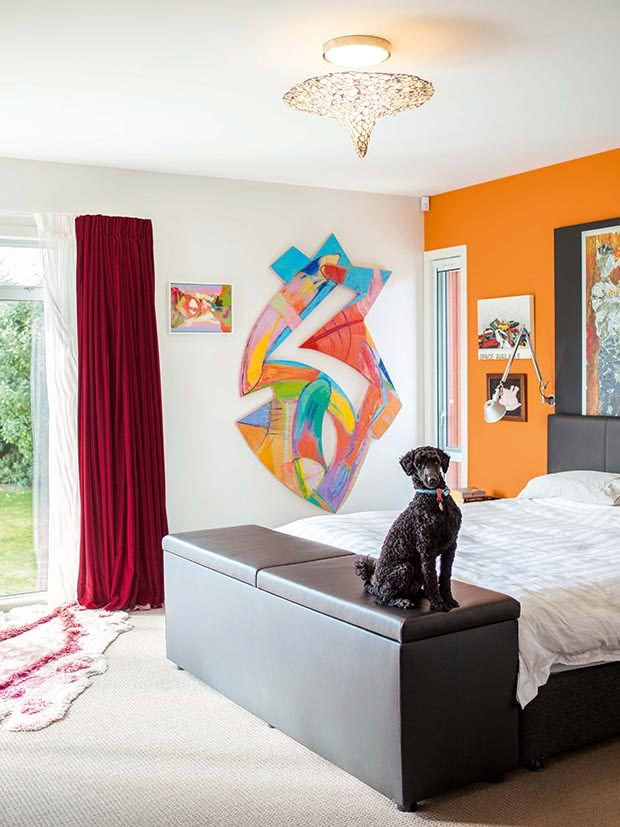
Poodle Max guards the Rob McLeod painting collection in Fiona’s bedroom. Rob was Fiona’s Wellington High School art teacher and then became a trustee of the Real Art Roadshow.
And the $7 million it cost her to mount, manage and run the project? Had the IRD thought she was on an money-laundering road trip? “That’s why the IRD told me that even though they didn’t find anything dodgy, I was still suspect. No apologies. How bizarre was it that almost the next day I’m awarded a medal for being a good and useful citizen?”
She thinks it couldn’t be dreamt up, and even though she laughs about it now, she didn’t find being investigated funny at the time. It’s all in the past, as is the Real Art Roadshow, though she has kept several favourite pieces to hang in her Wanaka home.
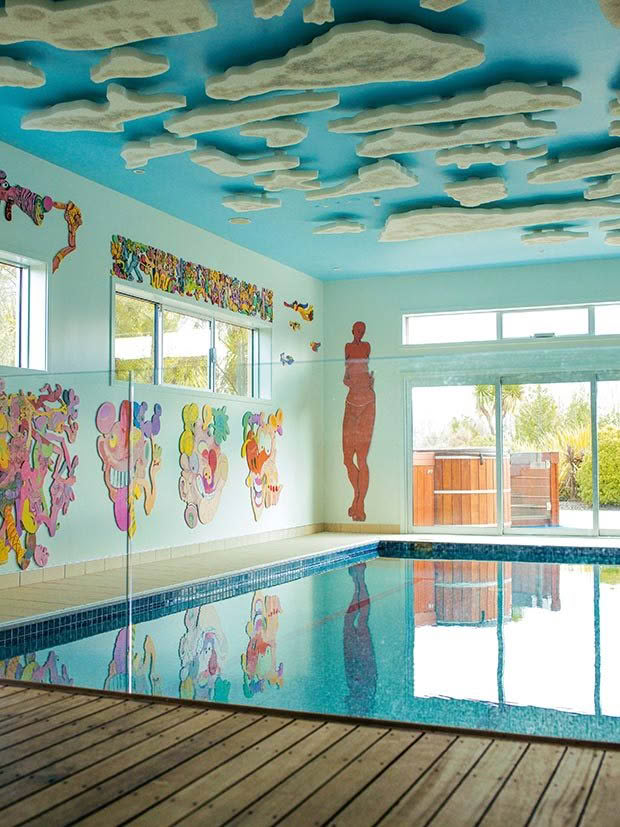
So what’s next for ethically inspired Fiona? While it’s true that some days she is happily absorbed watching her spoiled rooster and his harem of happy hens (who have the run of a chunky piece of pricey Wanaka garden) and painting miniatures of chickens (a hobby), she has set herself up to help others with their new-found wealth.
“I see myself being useful as a financial agony aunt of sorts for people who’ve suddenly come into money. I’m not a qualified financial advisor and I never intend to be, but in truth, there are very few people in this country who you can turn to if you’ve become wealthy overnight, who don’t want to sell you something and who have had a similar experience. We made some terrible mistakes, some horrendous property decisions, and bought what we liked and not what made sense.”
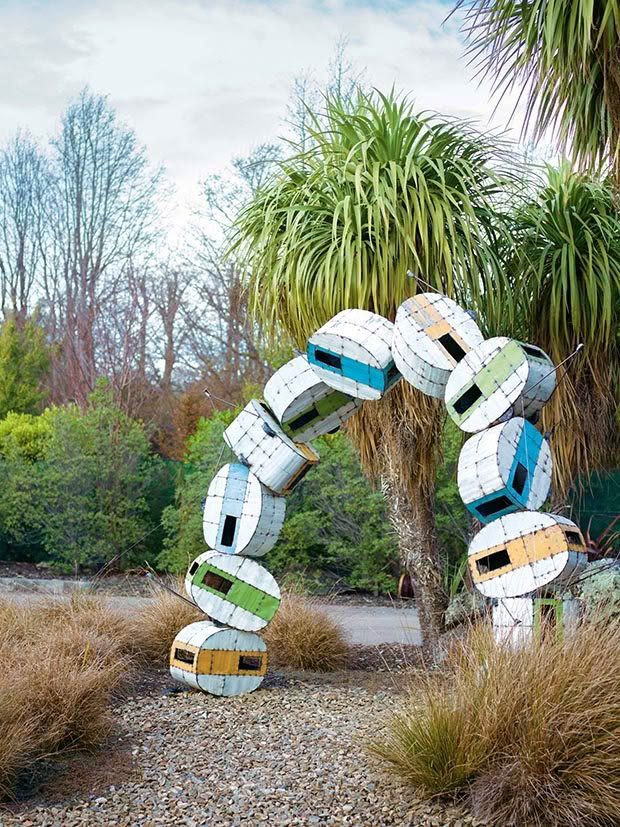
The wandering paths allow for a slow reveal of Hannah Kidd’s When Tortoises Go Bad II and Getaway Gateway, plus Dan Rutherford’s Encasement.
Fiona and her then-husband ended up owning 14 or 15 (she can’t quite recall) houses and very few were sound investments. And while it was fun, for a while, to choose each morning which car to drive, she got over that quickly as the hassle of having to keep everything in order (registered, insured, warranted, serviced…) became a full-time job. “When you come into wealth, you need a damn fine spreadsheet for starters. Keeping all your crucial asset information in one place makes your life a whole lot easier.”
In the past five years, she’s had great pleasure streamlining, but cautions it’s a lot easier to buy possessions than to sell them. She also combines her love of art and spreadsheets by helping art collectors build a catalogue of their own collections. “Having a collection (of any sort, not just art) properly catalogued allows collectors to make sense of what they have and to see where their passion really lies. It also identifies where the holes might be so they can have fun filling them. And – very importantly – it helps to locate, protect and insure them, and ascertain their value both fiscally and emotionally.”
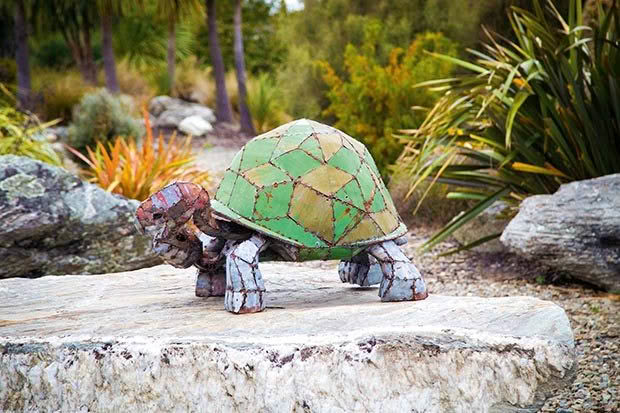
So for now and in the near future, when she’s not painting pint-sized portraits of poultry on Formica samples, Fiona Campbell might be meticulously cataloguing collections of art. Or helping newly minted millionaires manage a long-term happy relationship with their dollars. One thing is for sure, she’s convinced she’s finally starting to figure out what the good life really means.
LOOKING FOR A NEW FAMILY
Fiona fell in love with Ruah several years ago and her family has had many happy excursions sailing around New Zealand. Their favourite spot? The coastline off the Abel Tasman National Park, where they could be alone for days on end. “The quality of holiday family time on a boat is hard to beat,” says Fiona.
She had Ruah completely renovated (including installing a fireplace). But now, as life moves along, she has decided to part with it and continue her determined downsizing of possessions. She is,
she says proudly, finally the owner of just one car.
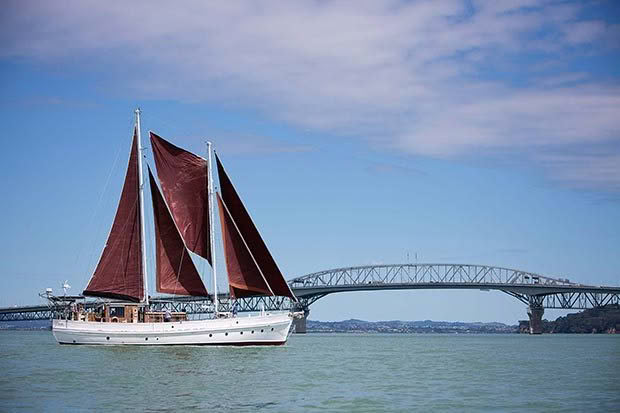
WHAT I’LL BE EATING
Cooking is definitely not my forté – I’ve been known to ruin an omelette. But I can throw things at a bowl. I’m definitely a fan of salads, and I’ve been growing my own veggies in my beloved Vegepod. This is one of my favourites.
FIFI’S NUTTY SALAD
Fresh spinach and kale leaves, a good fistful
¼ cup sunflower and pumpkin seeds, freshly toasted (I use a cast-iron pan and local olive oil)
½ cup red grapes, halved
¼ cup raw almonds and cashew nuts, roughly smashed
2 tablespoons shelled pistachio nuts
¼ cup goat feta, chopped or crumbled
Toss the ingredients together and drizzle over a dressing made from the juice of half a lemon, some olive oil, and a tablespoon of balsamic vinegar.
THE MUSIC I’LL BE LISTENING TO
A weird but wonderful album called The Race For Space by Public Service Broadcasting. It’s basically facts from the 1960s Space Race set to funky music.
WHAT I’LL BE READING
I try to read a great literary novel or two throughout summer, but this year I’m working on the re-boot of my own novella, Ruby’s Diary. Think Bridget Jones meets poultry. Be warned, there is some sex, a little bit of violence, and bad poetry.
Love this story? Subscribe now!
 This article first appeared in NZ Life & Leisure Magazine.
This article first appeared in NZ Life & Leisure Magazine.
